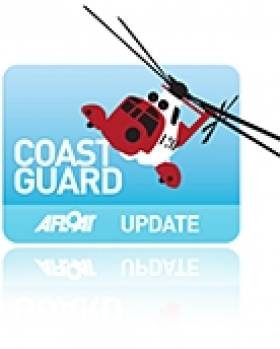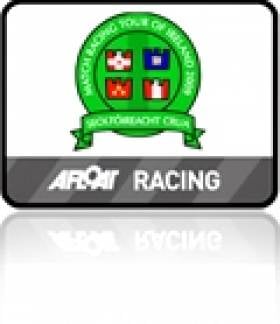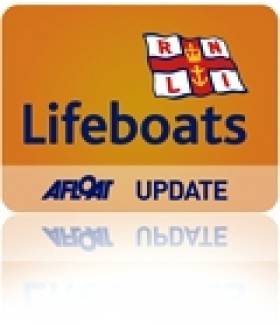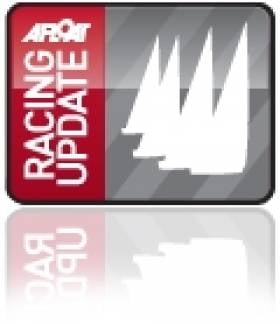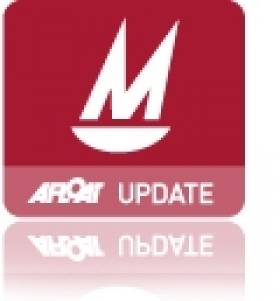Displaying items by tag: Belfast Lough
Bangor 'Not On Original List' of Coastguard Centre Closures
Northern Ireland’s only coastguard base was not originally among a list of those earmarked for closure, the Belfast Telegraph reports.
However the Bangor facility was added to the list after a "personal intervention" from UK Shipping Minister Mike Penning.
The minister has confirmed to the House of Commons that the original draft list of closures for streamlining the UK's coastguard service originally named Liverpool as the centre to be shut down.
Now the Bangor control centre is being pitted against Liverpool in the service shake-up as previously reported on Afloat.ie that will leave just three full-time coastguard stations across the UK.
Major Wind-Energy Hub Planned for Belfast Port
Belfast Harbour could potentially become one of the leading energy renewable hubs in the UK, when DONG Energy, a leading Danish energy firm, signed a letter of intent yesterday for an agreement to progress on a number of offshore wind farm projects in the Irish Sea.
In addition as part of the project, Belfast Harbour are to invest £40m in the development of a new 450-m long quay. The facility will be adjoined by a 50-acre logistics space on the southern shoreline of the port's docklands estate on Belfast Lough. The construction phase will create 150 jobs and up to 300 full time positions when the facility is completed, where the wind turbines and their foundations will be pre-assembled.
At that stage the large wind farm components will then be loaded onto specialist wind farm installation /construction vessels as depicted on the image by clicking here and to read further information on the overall project.
Attending the announcement which was held in Belfast Harbour Office, were representatives from the Northern Ireland Executive, Peter Gedbjerg, Vice President and UK Country Manager of DONG Energy, and Len O'Hagan, Chairman of Belfast Harbour. The energy hub scheme represents one of the harbour's largest ever capital investment projects.
Bid to Hold Women's Match Racing Event on Belfast Lough
In a further boost for the fledgling match racing scene here, top Irish international Umpire Bill O'Hara is looking to have the ISAF Grade one women's match racing event held on Belfast Lough from his home port of Bangor from August 17 - 20 2011, straight after the Weymouth pre-Olympic event.
Belfast Olympic Hope Presents £18,000 Boat to Charity
Twenty-year old sailor Tiffany Brien from Royal North of Ireland Yacht Club presented an £18,000 Paralympic sailing boat to local disabled charity Belfast Lough Sailability in Belfast Harbour today – the culmination of two years of fundraising by the 2012 Olympic hopeful.
The boat was officially launched today at Abercorn Basin, Titanic Quarter Belfast and was formally named 'Will Power' by Tiffany and Len O'Hagan, Chairman of Belfast Harbour. The significance of the name relates to a very close friend of Tiffany's, Will Doggart, who was paralysed last year following an accident. Will attended the launch today and has sailed in the new boat alongside Tiffany.
The 'Skud 18' sailing boat took two years to build in Australia and is the most high tech paralympic boat available. 'Will Power' is the first of its kind to arrive in Ireland and has already been committed to the goal of qualifying for the Irish Paralympic sailing team for the 2012 Paralympic Games - with local athlete Steve Frecknell hoping to compete for a medal. The boat will be the responsibility of Carrick based sailing charity Belfast Lough Sailability who will also use the boat to help disabled sailors to sail competitively in Northern Ireland.
Tiffany Brien began her fundraising campaign two years ago when she sailed 30 miles single-handedly across the Irish Sea from Portpatrick in Scotland to Belfast Lough raising a total of £18,400. Before launching the boat today she commented: "I am so excited to be sailing the new boat in Belfast Harbour today. It feels like I have been waiting for a long time for it to arrive. It is even more exciting that the Irish Paralympic sailing team has committed to using the new boat in their campaign for the 2012 Paralympic Games - fingers crossed it helps to bring a medal back."
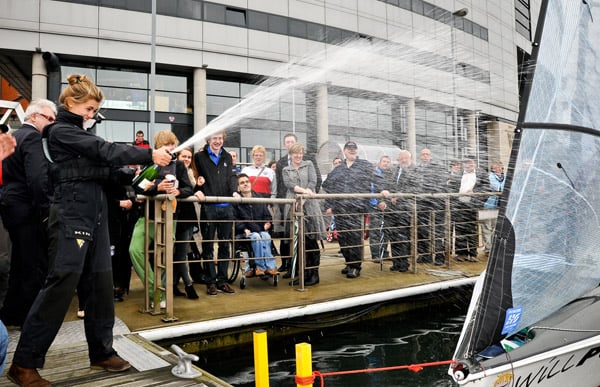
Tiffany will also be hoping to bring an Olympic medal back to Northern Ireland as she is currently competing to represent Ireland in the Laser Radial Class at the 2012 Olympic Games.
Nigel Thompson, Chairman of Belfast Lough Sailability comments: "Everyone at Sailability is totally overcome with the sheer determination and generosity Tiffany has shown in her fundraising campaign. The arrival of the boat today is the culmination of the dedication and resolve demonstrated by this young lady when she sailed singled handedly across the Irish Sea. Not only will our Paralympic hopefuls benefit from this but many other disabled sailors in Northern Ireland will get to enjoy this exceptional boat - including Tiffany's friend Will, who hopes to become an active member of Sailability and a keen sailor. We would like to thank Tiffany sincerely and wish her the best of luck in her own Olympic campaign."
Belfast Lough Sailability is a "not for profit", volunteer-based charity which, through the activity of sailing, enriches the lives of people with any type of disability, the elderly, the financially and socially disadvantaged.
Belfast Harbour has been the principal sponsor of Tiffany's Sailability campaign. BTWCairns, Airtricity, Stena Line, Belfast Telegraph and Ulster Bank and Brook House Art & Design are associate sponsors.
Bangor Lifeboat Crew to Receive Freedom of the Borough
The Atlantic 85 type lifeboat. the Jessie Hillyard. based in Bangor Harbour has two Yamaha 4-stroke engines giving a top speed of 35 knots. It features state of the art radar, chart plotter VHF radio and radio direction finding technology to enhance its lifesaving capabilities. Volunteer crew at Bangor take pride in a launch time of under four minutes from when their rescue pagers are activated.
Everyone connected with RNLI Bangor Lifeboat - the crew, station management, fundraisers and helpers - are all volunteers, giving freely of their time, braving all weathers, 24 hours a day, 365 days a year to help save life at sea.
Bangor's Lifeboat Operations Manager Kevin Byers also a volunteer is looking forward to receiving North Down Borough Councils highest award honouring the work of RNLI Bangor Lifeboat. He said
'We wish to publicly thank North Down Borough Council for their continued support and for honouring RNLI Bangor Lifeboat with this prestigious award' he added.
'It is a truly fitting tribute to the huge commitment and dedication of the Bangor volunteer crew and station personnel both past and present who have devoted so much of their time and effort to lifesaving at sea'
Related Safety posts
RNLI Lifeboats in Ireland
Safety News
Rescue News from RNLI Lifeboats in Ireland
Coast Guard News from Ireland
Water Safety News from Ireland
Marine Casualty Investigation Board News
Marine Warnings
Wallace, Murphy and Flynn Take Laser Titles on Belfast Lough
In the Standard Rig, Ronan Wallace (Wexford B & TC) took the title from Robert Espey (Ballyholme YC) and Stpehen Mc Lernon (Cushedall SC).
Annalise Murphy (National YC) won the Radial Championships from Philip Doran (Courtown SC) and Tiffany Brien (Ballyholme YC).
Annalise won 4 of the 8 races sailed including all three in the 16-20 knot breeze on Saturday. The National YC sailor becomes the first female sailor to take the Laser Radial Irish National title.
The 4.7 rig was won by John Flynn (Dungarvan SC) from Colm O Regan (Kinsale YC) and Stephen Duke (Courtown SC). The first girl in the 4.7 was Georgina Corbett (LDYC/NYC).
Kearney and Odell Crowned Mirror European Dinghy Champions
Racing was cancelled on the final day of the Mirror European Championships in Sligo yesterday so Thursday's overall result stood and the European trophy came home to Ireland. Ross Kearney and Max Odell from Belfast Lough were crowned European Champions 2010 after a series they led from start to finish. There was celebrations too in Rosses point for local pairing Beth and Shauna Armstrong who finished second in the 73-boat fleet. Results attached below.
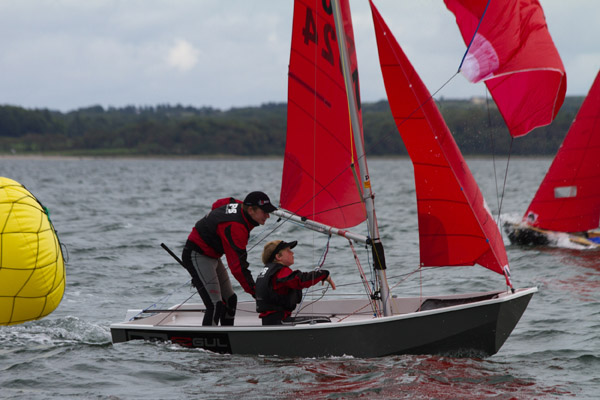
Ross Kearney and Max Odell from Belfast Lough were crowned Mirror European Champions on Belfast Lough yesterday. Photo: Gareth Craig. More photos on the gallery HERE



























